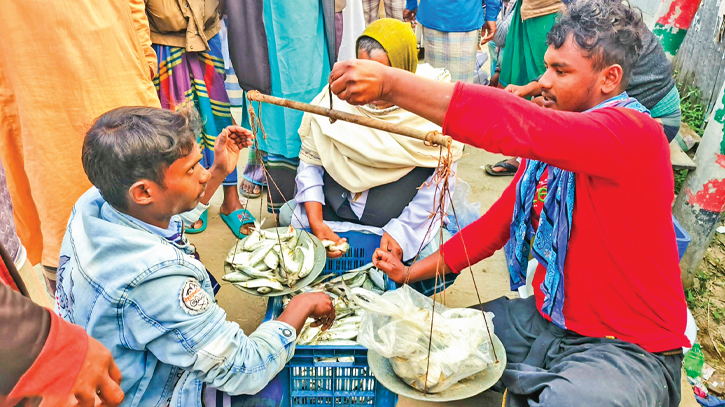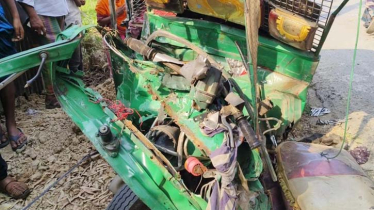
Caption: Hilsa fries, locally known as ‘jatka’, are becoming available in Shibchar upazila as a section of fishermen continues to net ‘jatka’ from the Padma River despite a ban. Photo: Messenger
In defiance of governmental regulations, a significant quantity of hilsa fries, locally known as 'jatka, are being illicitly captured from the Padma River and peddled at various haats and markets in Shibchar upazila of Madaripur district. Despite the ban on such activities, a section of fishermen is brazenly engaging in this trade, offering these prized catches at throwaway prices.
As dusk descends, the Padma River becomes a bustling hub of activity, with fishing boats dotting its waters and twinkling lights illuminating the scene. It's as if a grand festival has descended upon the river, with fishermen scouring its depths for hilsa fries without fear of repercussions.
Local residents lament the lack of enforcement by naval police and fisheries officials, attributing the unchecked hilsa fry killings to their apathy. While Coast Guard patrols are sporadically witnessed, their presence alone hasn't deterred the illicit trade.
Situated on the banks of the Padma River, Shibchar upazila annually observes a 22-day ban on fishing in October to allow the 'mother' hilsa to spawn freely. It takes nearly 7 to 8 months for hilsa fry to mature into reproductive adults, making the period from November to June a crucial conservation window during which catching, storing, transporting, buying, and selling of hilsa fries are officially prohibited.
In clandestine conversations, a jailer divulges the modus operandi of fishermen, revealing their preemptive maneuvers to evade authorities and carry out their operations unhindered. They operate with precision, relocating to safe havens before authorities arrive, ensuring minimal disruption to their illicit trade.
In the early hours, bustling markets along the riverbank witness a flurry of activity as fishermen arrive one by one with their night's haul of hilsa fries. Amidst the clamor of buyers and sellers, transactions unfold, creating an atmosphere akin to a festive occasion. The sight of these markets, visible even from the naval police outpost, underscores the brazenness of the trade.
A conscientious riverbank resident bemoans the lack of effective enforcement, emphasizing the dire consequences of continued illegal fishing on hilsa populations. They stress the potential for sustainable exploitation of this valuable resource and the economic benefits it could yield through regulated trade and export.
Under the Fisheries Protection and Conservation Act of 1950, the illicit capture and trade of hilsa fries constitute punishable offenses, with penalties ranging from imprisonment to fines. Despite legislative provisions, enforcement remains lax, enabling the perpetuation of illegal activities.
Efforts to reach Coast Guard officials for comment prove futile, highlighting potential challenges in coordination and communication among law enforcement agencies. Naval police officials acknowledge resource constraints but affirm their commitment to fulfilling their duties.
Messenger/Faria








